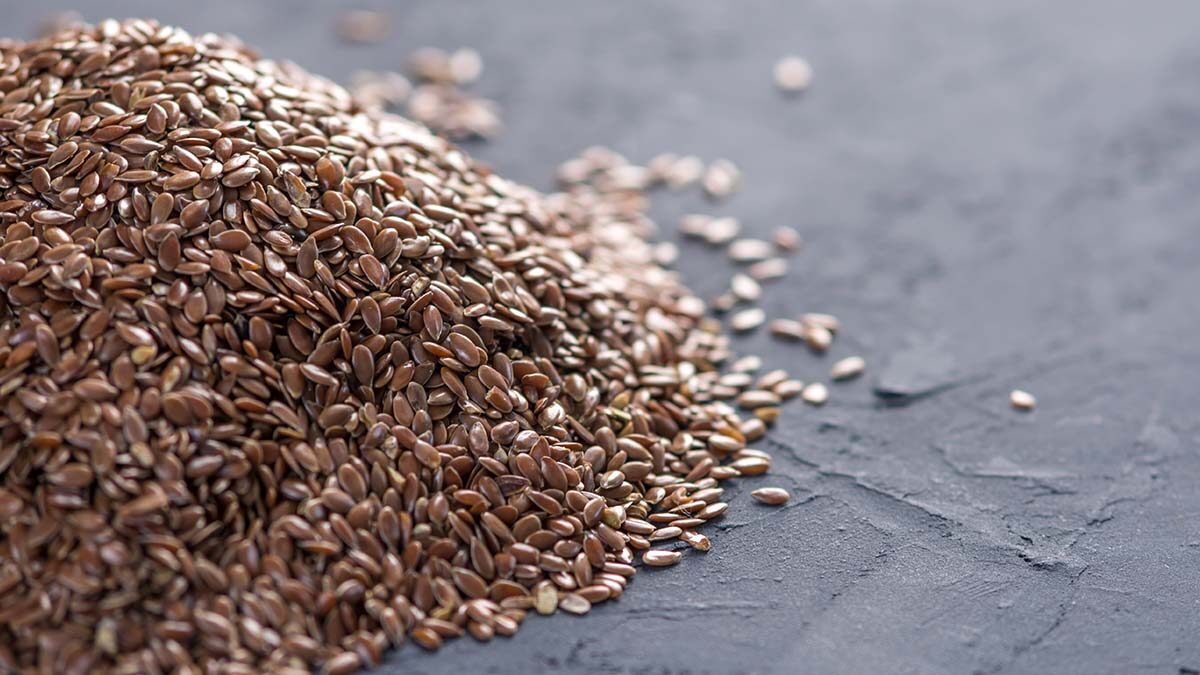A randomized, double-blind, placebo-controlled clinical trial of flaxseeds in breast cancer patients found that flaxseeds appear to have the potential to reduce tumor growth in just a matter of weeks. Scientists believe this is due to a class of phytonutrients known as lignans, which are present in flaxseeds at levels up to 800 times other plant foods.
Lignans can be thought of as the Western equivalent of the isoflavone phytoestrogens found in soy foods popular in traditional Asian diets, as they share many purported anti-cancer mechanisms. Since soy food consumption is associated with both preventing breast cancer and prolonging breast cancer survival, one might expect the same to be found for lignans. In Flaxseeds & Breast Cancer Prevention I covered the population-based, in-vitro, and clinical evidence supporting prevention, but what about for women already diagnosed with the dreaded disease?
Three studies were recently published that followed a total of thousands of women diagnosed with breast cancer. The first study from New York reported substantially reduced risks of overall mortality and especially breast cancer mortality associated with higher lignan intakes in postmenopausal women.
The next population study was out of Italy. At surgery, when the women were getting their primary breast tumors removed, they had some blood drawn; within 5 years those who had lower circulating levels of lignans were significantly more likely to die from their cancer coming back than those with more lignans in their bloodstream. The researchers concluded “Lignans might play an important role in reducing all-cause and cancer-specific mortality of the patients operated on for breast cancer.”
The latest and largest study to date was performed in Germany. Postmenopausal patients with breast cancer who had high blood lignan levels appeared to have better survival, and the higher the better. You can see the survival curve in my 3-min video Flaxseeds and Breast Cancer Survival: Epidemiological Evidence. Those who had the most lignans in their blood lived the longest and tended to live the longest disease free.
The population data looked so promising that researchers decided to put lignans to the test by feeding women flaxseeds, the most concentrated source of lignans, to see what would happen.
One of the ways the chemotherapy drug tamoxifen works is by boosting the levels of angiogenesis inhibitors like endostatin, which is a protein the body makes to try to starve tumors of their blood supply. Using a technique called microdialysis, you can stick a catheter into a woman’s breast and suck out some of the fluid bathing the breast cells. If you give women tamoxifen for 6 weeks, the levels of endostatin within the breast tend to go up, and the same thing happens when you instead add three and a half tablespoons of ground flaxseeds to their daily diet. As you can see in my video Flaxseeds and Breast Cancer Survival: Epidemiological Evidence, the flaxseed doesn’t seem as powerful as the chemo, but the results were so exciting that researchers undertook a randomized, double-blind, placebo-controlled, clinical trial of flaxseeds in breast cancer patients.
Breast cancer patients were randomized into either the treatment or the placebo group; either a flaxseed-containing muffin or a control placebo muffin every day between the time of their first biopsy and surgery. Researchers then had tumor samples before and after about a month of flaxseeds or no flaxseeds. Those lucky enough to be randomized into the flax group saw, on average, their tumor cell proliferation go down, cancer cell death go up, and their c-erbB2 score go down (a marker of cancer aggressiveness and potential for forming metastases and spreading).
The researchers concluded: “Dietary flaxseed has the potential to reduce tumor growth in patients with breast cancer. If the therapeutic index seen in this short-term study can be sustained over a long-term period, flaxseed, which is inexpensive and readily available, may be a potential dietary alternative or adjunct to currently used breast cancer drugs.”
For more on breast cancer survival, see:
- Breast Cancer Survival and Lignan Intake
- Breast Cancer Survival and Soy
- Breast Cancer Survival and Trans Fat
- Breast Cancer Survival, Butterfat, and Chicken
What about the role of flaxseeds in preventing breast cancer in the first place? See my video Flaxseeds & Breast Cancer Prevention.
A study similar to this was also carried out in prostate cancer patients: Flaxseed vs. Prostate Cancer.
See Anti-Angiogenesis: Cutting Off Tumor Supply Lines for more on the role diet plays in angiogenesis, the formation of new blood vessels to enable tumors to grow. I also have touched on briefly in Cancer as an Autoimmune Disease and How Tumors Use Meat to Grow: Xeno-Autoantibodies.
This is the final installment of my latest video series on flax. Feel free to check out the role flaxseeds may play in helping diabetes and sensitive skin.
-Michael Greger, M.D.
PS: If you haven’t yet, you can subscribe to my videos for free by clicking here and watch my full 2012 – 2015 presentations Uprooting the Leading Causes of Death, More than an Apple a Day, From Table to Able, and Food as Medicine.
